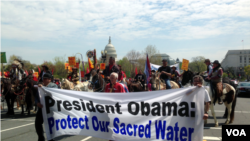The U.S. House of Representatives has passed legislation approving the construction of a controversial oil pipeline. The move followed a key court ruling that removes a major obstacle to the long-delayed project.
Friday was the tenth time since 2011 that the House has passed a bill approving the Keystone XL oil pipeline. But this time, the move is bolstered by a court decision that could make it more likely the $7 billion project moves forward.
The Nebraska Supreme Court on Friday approved a route for the nearly 2000-kilometer pipeline to cross the midwestern state. President Barack Obama had been waiting on the ruling before making a decision.
Speaking Friday during House debate, Republican Majority Leader Kevin McCarthy said the president now has no reason to veto the bill, as he has promised.
"There was a legal concern. Well the supreme court dealt with that. So today, we can join together in a bipartisan manner, just as we've done before, pass this bill, and [with] a new change in the senate with an open process, pass it there, and go to the [president's] desk and be signed, so 42,000 Americans can get back to work," said McCarthy.
The Keystone XL pipeline would carry more than 800,000 barrels of oil a day from Canada oil sands to refineries in the Gulf of Mexico.
Supporters say it would improve energy infrastructure, create jobs, and further reduce U.S. dependence on foreign oil.
But critics, including House Democrat Frank Pallone, say the project will hurt the environment and would not have a major impact on an economy that's already improving.
"Oil prices are at their lowest level in more than five years. Gas prices are now below $2 a gallon. Domestic U.S. oil production is skyrocketing. Tar sands are among the dirtiest and most carbon intensive of all fossil fuels. Approving the Keystone XL pipeline will create a dependence on tar sands crude, reversing the carbon pollution reductions we have been working so hard to accomplish," said Pallone.
The pipeline now heads to the newly Republican-controlled Senate, which could approve the measure by the end of the month. If so, that sets up a political showdown between Congressional Republicans and President Obama.
Michael Klare is a Hampshire College professor who writes about natural resources.
"The president will have to decide, 'Should we veto this and face all kinds of hostility from the Republicans in Congress but win the support of the environmental community,' or he'll have to say 'Well, I'm not going to make this a battle I'm going to fight on and I'll go along with it and then face the ire of the environmental community,'" said Klare.
On Friday, a White House spokesman said the president is studying the Nebraska decision, but stressed if the bill shows up on his desk, it will not be signed.




